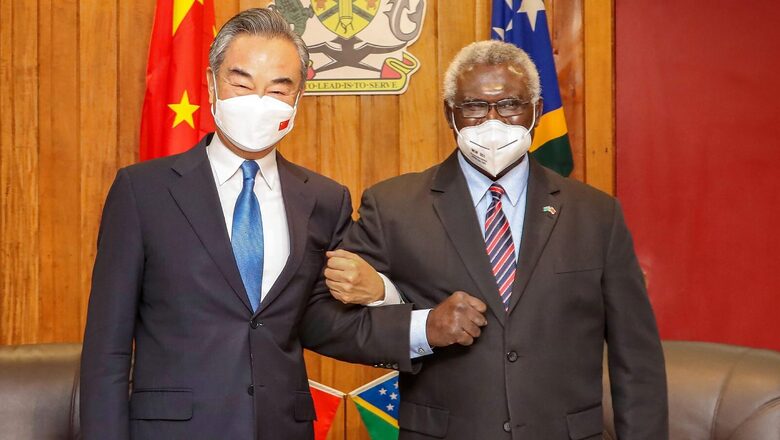
views
Chinese foreign minister Wang Yi will unveil a so-called Common Development Vision towards the end of visit in Fiji where foreign ministers of 10 out of the 14 Pacific Island nations that have diplomatic ties with Beijing will be in attendance.
Yi is currently on a 10-day trip to the Pacific Island nations and has visited Solomon Islands where earlier this year Beijing and Honiara signed a security agreement.
Even though on paper the proposal says that it will explore possibilities to create a free-trade zone between China and the Pacific, it also seeks to expand cooperation on law enforcement and cybersecurity, according to Nikkei Asia and the Wall Street Journal who have accessed the draft agreement.
Chinese foreign minister spokesperson Wang Wenbin said that Yi’s visit aims to deepen friendly relations between China and the Pacific and contribute to peace, stability and prosperity.
However, the clauses in the draft agreements as well as the security agreement signed with Solomon Islands and the new one being discussed with Kiribati will allow for cooperation in law enforcement and police cooperation.
It means that under the guise of these agreements Beijing could place its own military in these island nations endangering the security of Australia in its own backyard and also coming close to threatening the security of the western coast of US as the US Indo-Pacific Command in Hawaii.
It could also be China’s ploy to control shipping lanes and fisheries.
The China-Pacific Island Countries Common Development Vision will train the police and diplomats from these Pacific nations.
It will also set up Chinese propaganda outlets in the guise of Confucius Institutes, which claims to fund language studies but disseminates Beijing’s views on issues. Beijing also will provide aid with new border-control technology and aim to deepen cooperation in industries such as fisheries (where it has cornered traditional fishing communities with illegal fishing) and promote rules for data security.
One US ally in the region has taken the courage to thwart China’s designs in the region. The president of Micronesia David Panuelo, an island-nation that has close ties with Washington, said that the Pacific Islands may become collateral if China invades Taiwan.
In a letter cautioning other Pacific nations, David Panuelo said that the deal was the ‘single-most game-changing proposed agreement in the Pacific in any of our lifetimes’.
“Despite our ceaseless and accurate howls that climate change represents the single most existential security threat to our islands, the Common Development Vision threatens to bring a new Cold War era at best, and a world war at worst,” Panuelo warned.
Speaking to the Wall Street Journal, Richard Herr, academic and former director of Center for International and Regional Affairs at the University of Fiji, said that Pacific nations are likely to see this a ‘political hot potato’. He said instead of a sweeping success it could backfire.
Panuelo also warned that signing the agreement would mean that the Chinese would have more access to the control of fisheries and resource sectors in the region. He said that there is a possibility that China may intercept or overhear calls and emails under the agreement and also make it easier for Beijing to steal bio-data and follow people traveling to and from Pacific nations.
(with inputs from Nikkei Asia and The Wall Street Journal)
Read all the Latest News here




















Comments
0 comment